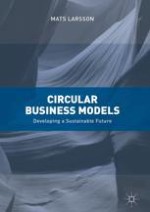2018 | OriginalPaper | Buchkapitel
14. Transportation Systems, Renewable Fuels, and Energy Efficiency
verfasst von : Mats Larsson
Erschienen in: Circular Business Models
Aktivieren Sie unsere intelligente Suche, um passende Fachinhalte oder Patente zu finden.
Wählen Sie Textabschnitte aus um mit Künstlicher Intelligenz passenden Patente zu finden. powered by
Markieren Sie Textabschnitte, um KI-gestützt weitere passende Inhalte zu finden. powered by
